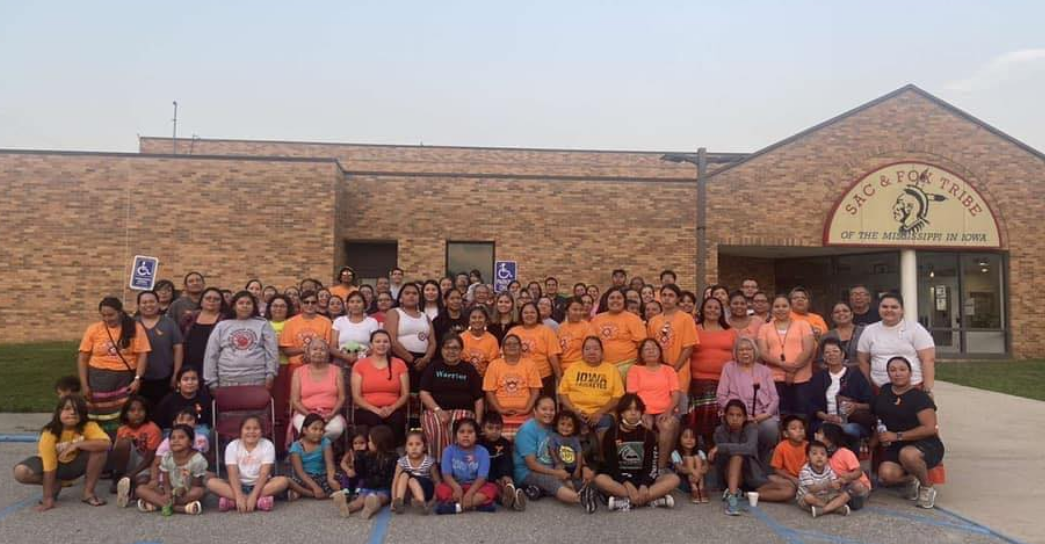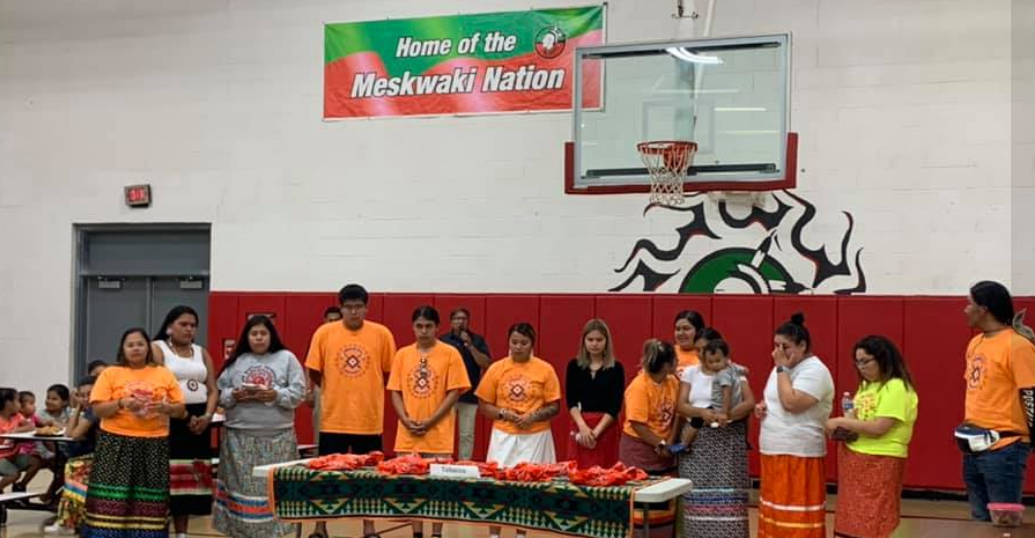
- Details
- By Levi Rickert
TAMA, Iowa — The long journey home from Carlisle, Penn.—both in distance and time—to the Rosebud Indian Reservation for the remains of nine children who died at Carlisle Indian Industrial School some 140 years ago included a stop Meskwaki Settlement, near Tama, Iowa on Thursday evening.
The remains were turned over to Rosebud tribal officials and 12 members of the Rosebud Sioux Tribe’s youth council, in a ceremony that included Interior Secretary Deb Haaland, U.S. Sen. Mike Rounds (R-SD), actor Mark Ruffalo, and others. After the nine cedar coffins were transferred, the Rosebud Tribe’s entourage left Carlisle on Wednesday afternoon to make the 1,400 miles trip back to their reservation.
Want more Native News? Get the free daily newsletter today.
On Thursday afternoon, the Rosebud entourage was greeted by the Tama Tribal police chief and Meskwaki Veteran Motorcycle Escort near Tama and then escorted into the Meskwaki Settlement.
As the Rosebud entourage arrived at the tribal gym where they were to be fed, a resounding silence fell upon dozens of Meskwaki Sac & Fox tribal citizens assembled for the historic moment.
“We realized what were looking at. The trailer carrying those nine little caskets. As a Meskwaki people we believe just as the Lakota people believe their spirits are here with them. So, it was very humbling and sad to realize we were literally welcoming these young little baby ancestors to our home for a moment,” Yolanda Pushetonequa, Meskwaki Sac & Fox tribal citizen, said to Native News Online.
“And then the mix of sadness and happiness as we saw the Lakota elders, youth and leaders get out of their cars and walk toward us. We didn’t have everything planned to a T, so I was not expecting that all our people would run outside when they showed up but we all did! Everyone just ran out of the gym to witness them pull in and get out. That was important for us and I’m glad we did greet them that way,” Pushetonequa continued.
 Members of the Rosebud Youth Council who escorted the nine remains of their ancestors back home. (Photo/Facebook)
Members of the Rosebud Youth Council who escorted the nine remains of their ancestors back home. (Photo/Facebook) According to Pushetonequa, the Sac and Fox Tribe as Lakota and Dakota relatives married into their community who live there.
"I feel like this was very important for them and a showing of support for them as well. I know they attended and it probably meant a lot to all of them that their Meskwaki relatives and friends did this for their people. But for everyone it was all for those children who never made it home. Everyone can imagine the pain of having their child taken from them and never to be seen again. That pain is never going to be gone but we felt like we had a chance to help someone as they go through this moment of healing," Pushetonequa added.
The Meskwaki Tribal Council on behalf of the tribe presented a gift to the Rosebud Sioux Tribe. Chairwoman Judith Bender and Treasurer Delonda Pushetonequa welcomed the Rosebud Sioux Tribe to the Meskwaki Settlement upon their arrival and presented a large replica clay pot. Tribal citizens came together to feed the Rosebud entourage.
The Rosebud entourage continued their journey home to the Rosebud Indian Reservation. They arrived Friday and the nine children who died at Carlisle were laid to rest for their final time.
Tell Us What You Think
More Stories Like This
Native News Weekly (August 25, 2024): D.C. BriefsDeb Haaland Rolls Out Affordability Agenda in Albuquerque
Boys & Girls Clubs and BIE MOU Signing at National Days of Advocacy
National Congress of American Indians Mourns the Passing of Former Executive Director JoAnn K. Chase
Navajo Nation Mourns the Passing of Former Vice President Rex Lee Jim
Help us defend tribal sovereignty.
At Native News Online, our mission is rooted in telling the stories that strengthen sovereignty and uplift Indigenous voices — not just at year’s end, but every single day.
Because of your generosity last year, we were able to keep our reporters on the ground in tribal communities, at national gatherings and in the halls of Congress — covering the issues that matter most to Indian Country: sovereignty, culture, education, health and economic opportunity.
That support sustained us through a tough year in 2025. Now, as we look to the year ahead, we need your help right now to ensure warrior journalism remains strong — reporting that defends tribal sovereignty, amplifies Native truth, and holds power accountable.
 The stakes couldn't be higher. Your support keeps Native voices heard, Native stories told and Native sovereignty defended.
The stakes couldn't be higher. Your support keeps Native voices heard, Native stories told and Native sovereignty defended.
Stand with Warrior Journalism today.
Levi Rickert (Potawatomi), Editor & Publisher

